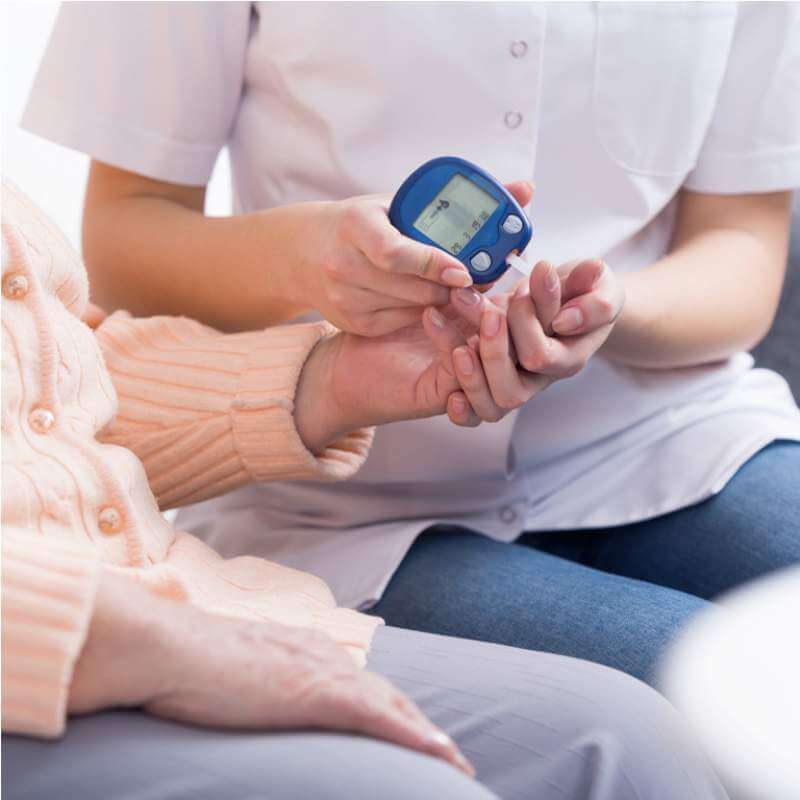If you or a loved one is suffering from type 2 diabetes, it is even more necessary to get yourself tested for dementia. According to a recent research, diabetes shows a consistent risk factor for cognitive decline, mild cognitive impairment and dementia.

Even though some memory loss is a natural part of aging, it is never severe enough to interfere with your daily tasks. It may be normal to forget an appointment or a person’s name and remember it later, but if symptoms are persistent and getting worse overtime, they shouldn’t be ignored. Symptoms could include being unable to recognize the names and faces of close loved ones such as sons, daughters or spouses, unable to change, clean oneself etc.
In such a case, dementia may be a strong possible cause. Dementia is an umbrella term used to describe a set of symptoms that include loss of memory, changes in mood or behavior and an inability to carry out simple,day-to-day tasks.
Evidence suggests that diabetes increases dementia risk
 People with type 2 diabetes have been found to have an increased risk of dementia compared to those who do not have diabetes.
People with type 2 diabetes have been found to have an increased risk of dementia compared to those who do not have diabetes.
According to a study that was performed by the American Diabetes Association, diabetes leads to a 20–70% greater decline in cognitive performance, and a 60% higher risk of developing dementia, especially Alzheimer’s disease and vascular dementia.
The main reason behind this is impaired insulin secretion and glucose intolerance. Even pre diabetic people with symptoms like insulin resistance, have an increased risk of developing cognitive decline and experiencing increased rates of brain atrophy.
Both these conditions lead to dementia within a few years. Another factor which highlights the connection between diabetes and dementia is cardiovascular problems associated with diabetes that are also seen in people with dementia. Some of these are as follows;
- Obesity
- Heart disease or family history of heart disease
- Impaired blood vessels
- Circulation problems
- High cholesterol
- High blood pressure
But on a positive note, a number of researches underline the fact that if diabetic patients are treated with medications, they show improvement in cognitive function within 24 weeks, as compared to those who were not treated for diabetes at all. This is why, it is essential for all middle-aged adults to get their blood sugar tested regularly, because early diagnosis and treatment of diabetes can save one from the onset of dementia.
Managing diabetes to lower the risk of dementia

Diabetes is a condition that can be managed effectively. But,it can be a tricky disease to diagnose; this is why, it is important to get yourself tested if you are facing even the slightest symptoms of diabetes. Your doctor will ask for your urine and blood samples that will be sent to the laboratory to perform the necessary tests.
Once your doctor confirms that you are suffering from diabetes, it is crucial to take the prescribed medication daily. Type 1 diabetes is treated through insulin and type 2 diabetes, which is a progressive condition, can be managed with medication, improvement in diet and moderate exercise. Medication for diabetes helps to bring down the blood sugar levels and it may sometimes take a while for the body to adjust on the right dosage. Doctors usually prescribe a three-month course of Met form in and observe the results.
Reducing your risk of diabetes and dementia

All doctors stress that apart from medication diabetes patients have to follow a proper diet and exercise regime to stay healthy.
Having diabetes doesn’t mean that you have to give up on all your favorite food. The secret is to follow a balanced diet that has a variety of healthy carbohydrates, fats, and proteins. It is important to keep your blood sugar in the target range at all times. Avoid excessive intake that can cause a sudden influx in your blood sugar levels which can be dangerous.
Exercise is also a key factor in making your insulin levels more effective. Light exercise lowers your insulin resistance and makes it easier for the body to absorb the glucose more effectively. This is why,regular workout sessions can help diabetes patients overcome further complications like heart diseases and the onset of dementia.
Follow a healthy lifestyle maintains your physical and mental health. Here are some important points that can help you fight diabetes and dementia:
- Eat food that is rich in vitamin D, folate, and B6 and B12 vitamins.
- Make it a habit to exercise both your body and mind regularly.
- Be socially active and don’t be afraid to take on new challenges in life
Dr. Clare Walton, Research Manager at Alzheimer’s Society in the UK, states, “While there’s currently no cure [for dementia], we know that the best way to reduce your dementia risk is to eat a Mediterranean diet rich in oily fish and vegetables, keep physically active, not smoke and have your blood pressure regularly checked.”
Raising awareness about dementia

According to a UN report, the number of people with dementia is expected to double every 20 years globally. This is an alarming rate for ageing members of all societies. Therefore, it is important to raise global awareness about dementia.
Since dementia is not a disease but a syndrome, it is difficult to diagnose it without proper awareness. If you think you may have dementia, the easiest way to get yourself checked is to get an online dementia test. There are many websites available that offer brain tests, the results of which can be taken to your general physician for further analysis.
While it can be devastating to be diagnosed with dementia, early detection can help you cope with the symptoms in a much better way. Some symptoms of dementia can be delayed or slowed down considerably with medication. This is why, timely diagnosis can help a patient stay independent and plan in advance.
Conclusion
Diabetes and dementia, both are on the rise. Many factors contribute to their prevalence, especially the unhealthy lifestyle that is becoming a norm in today’s era. We need to start taking care of our body and mind, if we want to live a long and healthy life. Remember, what’s good for your heart is good for your brain as well!
Author Bio:
Evie harrison is a blogger by choice. She loves to discover the world around her. She likes to share her discoveries, experiences and express herself through her blogs.
Find her on Twitter:@iamevieharrison

 Evie harrison is a blogger by choice. She loves to discover the world around her. She likes to share her discoveries, experiences and express herself through her blogs.
Evie harrison is a blogger by choice. She loves to discover the world around her. She likes to share her discoveries, experiences and express herself through her blogs.